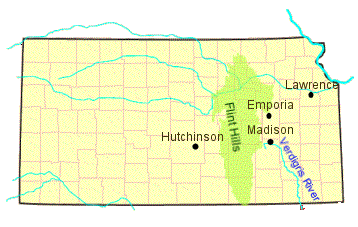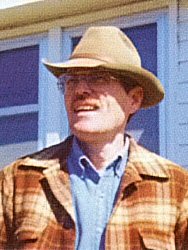|
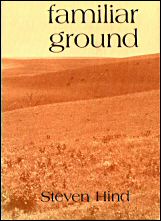
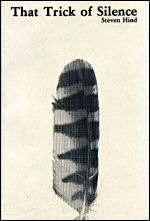
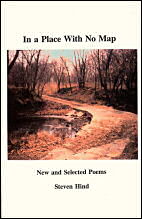
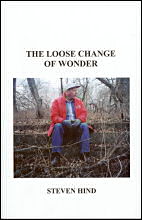
|
| Biography |
|
| |
Born and raised
near Madison, Kansas, on the
eastern edge of the Flint Hills, Steven Hind is thoroughly Kansan.
He attended Emporia State University as an undergraduate, and received
his Master of Arts from the University of Kansas in 1970. He began
teaching literature at Topeka High School in 1965, and retired 36
years later from teaching English at Hutchinson Community College.
He has been referred to as "the most Kansas Kansas
poet I've ever heard." (Robert Stein, English Dept. Chair,
Washburn, University.)
Return to Top
of Page
|
|
|
Bibliography ( - housed in Thomas Fox Averill Kansas Studies Collection) - housed in Thomas Fox Averill Kansas Studies Collection) |
|
| |
First published in the Kansas Quarterly
magazine, Steven Hind is the author of four published books of poetry.
 The Loose Change of Wonder (CKS/Woodley Press, 2006) The Loose Change of Wonder (CKS/Woodley Press, 2006) Just Folks: Memories of a Country Life (Woodley Press, 2005) Just Folks: Memories of a Country Life (Woodley Press, 2005) Waking in the Flint Hills: Poems of the People and the Land (Greenjeans Studios, 2004, CD) Waking in the Flint Hills: Poems of the People and the Land (Greenjeans Studios, 2004, CD) In A Place With No Map (CKS/Woodley Press, 1997 In A Place With No Map (CKS/Woodley Press, 1997 That Trick of Silence, Washburn University Center for Kansas
Studies, 1990 (Out of print) That Trick of Silence, Washburn University Center for Kansas
Studies, 1990 (Out of print) familiar
ground ( Cottonwood Review Press, 1980 (Out of Print)) familiar
ground ( Cottonwood Review Press, 1980 (Out of Print))
Return to Top
of Page
|
|
|
| Writing
Samples |
|
| |
South of El
Dorado
for Jim
If you are from Kansas
you can imagine the cooling sky
and the dew-softened rattle
of an old truck rolling
to a stop on the dam--
The deliberate movements of fishermen
lifting out poles and beer
and walking to thepond,
the baiting up and cool beer
in the dark. There, waiting
is a life of its own.
Later in the silence
a tug at the chicken liver,
the dark feelers
in touch with fingers on the line,
The tail feathering a hold
on a deep place.
You imagine the shock of the hook
and the last thud
of the hatcher and the strung-up
agony of the long fish.
the smooth skin
stripped and hanging in blue fingers
from the pliers.
Butchered flesh quivers
a little in the ice chest
and the cleaving gills
give up. At last.
the heads hang staring
at the stars until morning
on the barbed wire.
At the end of summer you count
52 catfish heads hanging
on a north/south fence
deep in the prairie swinging
like thieves in the wind.
---familiar ground
Kansas: Boring!
I had driven that road
In dust and in mud a hundred
Times in a thousand days, I
Suppose, hauling chores
On the stretched gravel
Between bluestem pastures.
Nothing much to see, right?
Only the usual meadowlarks
Flirting with the windshield,
Except on that hundred and
First trip on a steamy
Morning in May after a night's
Rain running in the gulley past
The old Hunt Place where I came
Upon the craggy hulk clanking
Across the road, snapper as big
As a scoop shovel, his beak
A machine for cutting off fingers,
His yellow eye so old it said
Nothing, a carapace of mossy
Sawbone, leather legs wearing
Bearclaws, making tracks for
Breeding grounds, I guessed,
Restless with the new beginning
Of grass from pond to pond.
I thought of Granddad's saying,
"Eighty percent of this prairie
is below the surface." In spades
I thought: anything can take its
Time and crawl up out of this old
Place. So now, when I've had too
Much of t.v. and taxes, I go out
Over this land I live with, on some
Pretense of erranc. I pray for rain.
---That Trick of Silence
Finding the Calf
Wind breathes in the new
leaves along the creek.
Mockingbird solos,
every note improvised
and right. The mare prances
when the cow shows herself,
swings round, broken rope
of afterbirth swinging
beneath her tail. She noses
her black calf, wet and still
in the grass, new grass
fat with spring. Welcome,
welcome. Even with no name
you will always be the calf
born on the finest day of April.
To see you will make me glad.
---In A Place With No Map
Her Coyote Dream
I wanted to crawl into her den
and become a part of that
place, she said.
I resented my car back there
on the road, giving me away.
I lay in the sweet grass watching
that hole where the big female
disappeared into the earth,
and the wind assembled a chorus
of grasses to make me believe
I was at one with the land.
I wanted more than anything
ever in my life
to enter and belong.
---In a Place With No Map
Waking in the Flint
Hills
Piercing the peace of a morning moon,
an oil well bows its head and squeaks
up a dipper of crude. In the far darkness
a diesel fumbles gears to make the grade
as two crows by the roadway caw about
breakfast on the asphalt, and the natie
grasses whisper under another assault
by the grazers. A Brangus ruminates
behind a scrim of sumac. A quavering
column of coyote song rises to the sky:
"This is a good day to cry!" they might
be singing. A poet in his tent joins in,
reciting his sword words over the world.
---The Loose Change of Wonder
White Sign
Where the boys had been farmed out
to the twin cabins a shouting distance
from the house, I found the white hat
boxed on the plank above the bunks.
Which boys had lived there I imagined:
Fred and Sam, taking the whole place
after old Fred died, their mother leaving
no doubt about her weird helplessness.
That hat, as clean as new, nestled in
its womb of tissue paper, the sun-
splintered silence of the empty cabin-
some days I think of that dress Stetson,
its perfect uselessness sequestered
in a fancy box, its crown unturned, as if
awaiting a handout, say the loose change
of wonder in that house of the long-lost.
---The Loose Change of Wonder
Summer Night
(for William Stafford)
On the road tonight with that
shovel of stars overhead, Milky
Blur I christen it, Bill, I
thought of you, traveling
the dark with the trucks and
the skunks. Near Abilene
a pale stain passed under my
lights, apostrophe from some
deer meeting fate in a confusion
of headlights, and your poem
whispered its steady purr
over another recent killing.
At two,
past all disasters that did
not happen tonight, I squat
in a bath of breezes under
my cottonwood. This to say:
Thousands of leaves believe
in summer tonight, saying,
Be true. You are. Adios.
---The Loose Change of Wonder
Return to Top of Page |
|
|
| Other |
| |
Steven Hind has recorded a CD
of 43 of his poems, recorded in his voice. The CD, Waking
in the Flint Hills, is available by contacting him at:
503 Monterey Place
Hutchinson, Kansas 67502-2229
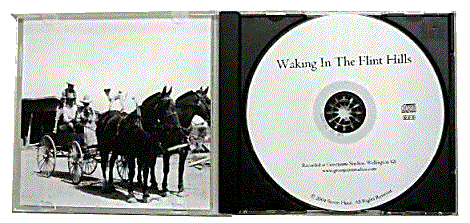
Hind audio track 3, Abstract Landscape: http://av.washburn.edu/ramgen/averillto/2007012503056.rm
Hind audio track 23, Song for the Dancing Dog: http://av.washburn.edu/ramgen/averillto/2007012523056.rm
Hind audio track 43, Summer Night: http://av.washburn.edu/ramgen/averillto/2007012543056.rm
Hind audio track 45, O'Keefe: http://av.washburn.edu/ramgen/averillto/2007012545056.rm
Return to Top of Page
|
Unpublished
Work |
|
| |
Prairie Dog
The fat burrower who wears the name
is convivial enough, but "man's best
friend"? The dog of the prairie proves
the title by pointing a sharp muzzle
at the darkness in a thousand oil
paint sunsets. Under wide and naked
skies with their suns halved by horizons,
a silhouette sits against the hypotenuse
of its backbone, scruffy omnivorous Lassie
who sings for no master save the world.
Folk Artist
His art has its tongue
in its cheek, arc welder
articulating rake wheels
into sunflowers, pitchforks
into wind chimes, jangling
jokes about melody. From
the hardware of his salvage
sparks shower down
bright riffs on novelty.
Painting Her Dues
She found within the desert's strange decay
Transcendent forms her brushes could display
In the artist's ecstasy, known in a lonely way:
The bleached bone held open to the sky,
It's perfect curve's caress upon the seer's eye.
High Plains Planting
At this end of the myth of efficiency crawls
the plow that breaks the plain, sod monster
fingering the pillaged soil with tines of steel
on a frame the width of a road, powered by
an engine herding its horses in the thunder
of explosions, mufflered to murmurs and fumes
spewing windward as plastic kegs the size
of cisterns meter out petroleum fecundity
into the broken soil. This machinery brokers
a bounty the pioneers never dreamed. Then
why this sense of squandered promise? Why
a haunting in such mastery over the land?
Emptiness carries the smoke northward
across the land of the South Wind People.
|
|
| Author
Interview |
| |
The answers to these questions are excerpts.
Q: When did you first begin writing poetry?
A: Steven replied that he had recently found, in
a box of his mother's things, a poem about geese flying over the
farm in fall. "So I guess I would have to say that occasionally
I was trying to write poetry from an early age. ...I wrote a few
poems during my college days,... but I didn't sustain the attempt
to write poetry until I began teaching ...(American literature,
my great love) at Topeka High School in 1965. I suspect that teaching
poetry caused me to begin to understand the form of great poems
more richly than I had previously, thus I began to 'get it'."
Q: When did poetry become your avocation as well as your
vocation?
A: In response, Steven Hind reported that it was 1970 when
he first began writing poetry that felt right, and began sending
things out to magazines. "By the mid-seventies I was committed
to the craft with a sense of confidence: I was a poet. I have never
pursued poetry as a vocation. Teaching has been my vocation, but
the dividend is that, as a teacher, you are usually teaching yourself
more than anyone else in the room."
Q: You taught at Hutchinson Community College for some
time. What aspect of teaching did you find the most frustrating?
A: Hind notes that teaching English at a community college
is essentially a service. He was told by students, "more times
than I like to remember," that they just wanted to get their
English out of the way. "Often my best students were not in
the least interested in writing for its own sake... But I caused
a good many students to re-evaluate reading and writing, a most
satisfying conversion when it happened...I should confess that I
found teaching immensely satisfying when it succeeded."
Q: Is the home in which you grew up still in your family?
A: "...yes, the land where I roamed as a kid is still
in the family...but when my parents had to leave the farm, something
irrevocably changed in my relationship to the place...things change
and you change with them, like it or not. I feel closest to a small
pasture on the hill across the river and above the farm where I
roamed with my dog as a kid. I still camp there in good weather...it's
forever vivid in my head, or my heart."
Q: Your poetry reads like personal experience. How much
of what you write is based on your experiences, and how much is
based on dreams or imagination?
A: "I would say that my poetry usually springs
from personal experience, treated by imagination, or laundered through
imagination by the catalyst of emotion. Camping under a night sky,
rambling in windy grassland in glorious privacy, and so on - the
experiences generate a kind of ecstasy that I spin out into words
as a matter of habit."
Q: It seems apparent to me that William Stafford was a
major influence in your life, as he was in the lives of so many
Kansas writers. Is there another person you consider to be a major
influence in your writing?
A: "I think Stafford has influenced me in ways I can't
even explain. I know that I can be reading his poetry and suddenly
have a flash of possibility in my own mind that has no discernible
relationship to what I'm reading in his work. It's strange...No
one I can think of offered such a generous invitation to participate
in the art as he did...as for others who influenced me? Well, my
mother, first of all. She read to us every night when I was a child...I
suppose we were all seduced by modern criticism and T.S. Eliot in
college. It was not until I began teaching that I realized how far
my sense of life was from his (and lucky for me). I remember William
Carlos Williams..." Hind stated that when he realizes something
he is writing is perceptibly influenced by another poet he stops
writing it. He listed Elizabeth Bishop, Alan Dugan, and Robert Lowell
as other poets who provoked deep admiration, if not directly influencing
him. "Harley Elliott of Salina has been a long-time friend,
and we exchange poems in letters, have for years. I often take his
suggestions for changes that a poem needs, much more than he benefits
from mine, I suspect. I've just been reading a good bit of Jonathan
Holden's work, and his intelligence is refreshing, invigorating..."
Q: What is your favorite recently-read book?
A: The last book of poems I read that really set
me back on my heels, and it's been a while I confess, was Linda
Gregg's Too Bright To See. She went to Greece and took
a little stone house and stuck to her business. What she did for
that place is what I want to do for mine, would like to do for mine:
create that charged sense of being alive in a particular locale...I
value books that take up the real issues that face us, rather than
the issues politicians use as distractions. Prodigal Summer,
by Barbara Kingsolver; At Home on This Moveable Earth,
by William Kloefkorn; Flint Hills Cowboys, by Jim Hoy...many
of Tom Averill's short stories stick with me, rich in authentic
detail and wisely humorous...The New Yorker when it's good...my
favorite plays are Hamlet and The Glass Menagerie...as
you can see, I read as if at a Smorgasbord.
Q: What is your favorite movie?
A: I don't know that I have a favorite movie. It's
easier with books. The Great Gatsby is an American masterpiece
that I cherish. It's so good that it can't be made into a successful
movie..Hud...Apocalypse Now! is abrilliant failure
about the horrors of war...The Treasure of the Sierra Madre...The
Hours just knocked me back on my heels, to name a recent movie
that's fine.
Q: What is your favorite style of music?
A: "...folk music still appeals to me most of all...I
like music that employs American elements--much of Copeland's work,
and 'The Grand Canyon Suite'. I reveal myself as narrow and unsophisticated."
Q: Have you written short stories?
A: "I wrote a couple of novels, neither of
which ever quite worked... I wrote a number of short stories, but
only two of those have been published." Hind stated that, in
a fiction writing course during his junior year in college he wrote
a story about finding a dead body called Sing, Damn It, He's
Dead. "It attempted to deal with the same experience of The Third of September in Sixty-Three (Loose Change
of Wonder). So it's only taken my forty years to find the form
for that subject."
Read complete interview
Return to Top of Page |
|
|
| Primary Documents |
|
| |
Three Poems by Steven Hind, 1984
Poem by Steven Hind - "Coming Home on Memorial Day, 1987" - May, 1987
Poem - "Valentine's Day" - by Steven Hind, February, 1992
Poem - "Shirttail Poet in His State" - by Steven Hind, November, 1992
Letter from Steven Hind, October, 1993
Poem by Steven Hind - "Zoo You Too"- July, 1993
Poem and Letter from Steven Hind, July 1993
Letter and Poem - "The Last King" - by Steven Hind, September, 1993
Poem - "Eyes Like a Lizard" - by Steven Hind, September, 1993
Letter from Steven Hind, January, 1994
Poem - "Badger" - and Letter from Steven Hind
"Tricks" by Steven Hind
Return to Top of Page |
|
|
|

![]() Return to Hutchinson
Return to Hutchinson![]() Return
to KANSAS MAP
Return
to KANSAS MAP 